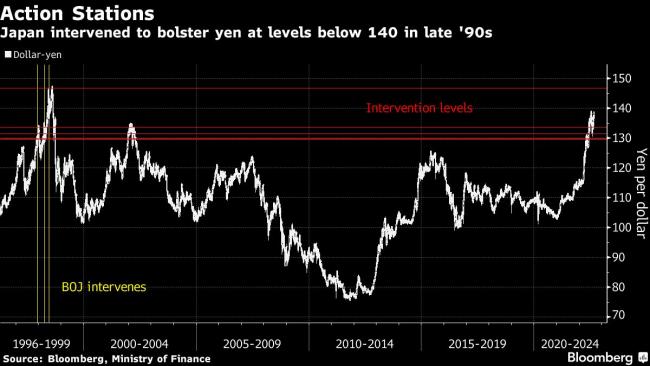
(Bloomberg) -- The slide in the yen back toward the key psychological 140 per-dollar level is reigniting chatter on the likelihood officials will intervene to support the Japanese currency.
With traders refocusing on Japan’s interest-rate gap with the rest of the world amid a chorus line of hawkish Federal Reserve commentary, the yen has tumbled close to 4% this month and traded around the 138.50 level Tuesday. That’s a hair’s breadth from a fresh 24-year low and the 140 level which some market watchers have flagged as key for policymakers.
“There will likely be some sort of verbal intervention as 140 approaches,” said David Lu, director at NBC Financial Markets Asia in Hong Kong. “But an actual intervention is likely to be ineffective at this point where the dollar is rising broadly on US monetary policy prospects while there is no support for the yen from the Bank of Japan.”
Fed Chair Jerome Powell’s speech at Jackson Hole last week made clear concerns about the economic slowdown are not a priority, wiping out lingering optimism of a softer stance on rates. BOJ Governor Haruhiko Kuroda in contrast repeated the need for continued easing, highlighting once again the stark differences between Japan and the US that heaped pressure on the yen earlier this year.
A gauge of the yen’s implied volatility from the options market signaled about a 51% chance that the yen will touch 140 within a week, according to data compiled by Bloomberg.
If the yen hits a fresh 24-year low, a three-party meeting could be held between the Ministry of Finance, BOJ and the Financial Services Agency, said Masafumi Yamamoto, chief currency strategist at Mizuho Securities in Tokyo. That’s what happened in June, when officials said they would take action if necessary, without specifying what that would be.
The yen was trading around the 134 per dollar level then.
“As long as the US keeps raising rates, the yen has more scope to the downside to around 142,” said Yamamoto. But “as the dollar’s rise is tied to policy outlook, Japanese authorities likely will see actual currency intervention as futile at this point.”
The last time Japan propped up the yen was during the Asian financial crisis of 1998 when it reached around 146 to the dollar. It had previously intervened at levels around 130.
Some strategists see a shift in policy from Japan’s central bank as more likely than outright currency intervention, even though economists doubt such a move would happen before Kuroda steps down in April.
“We don’t think the BOJ and the Ministry of Finance will be happy to see us moving north of 140 yen on a sustained basis,” said Ray Attrill, head of foreign-exchange strategy at National Australia Bank in Sydney. “But rather than expect currency intervention, more likely in our view is a tweak to the yield-curve control policy.”
©2022 Bloomberg L.P.

